The first all-campus forum for 2025, held at the Munroe-Meyer Institute, highlighted both MMI and UNMC’s commitment to community engagement, while also offering updates on MMI’s research and clinical activities.
UNMC Interim Chancellor H. Dele Davies, MD, began by expressing gratitude to faculty, staff and students for an extraordinary 2024. Record enrollments, increased research funding and expanding clinical programs marked a year of significant milestones.
Medical center employees can see a recording of the forum here.
Dr. Davies said he continues to meet with community leaders in Omaha and rural Nebraska, most recently OneWorld Community Health Center in South Omaha, to look at opportunities to expand partnerships within rural and underserved communities for student and resident training.
“We continue to look at our communities across the state, especially as we grow our student populations in rural Nebraska,” Dr. Davies said. “We’re particularly interested in making sure that our students have the best possible accommodations and facilities where they can actually feel at home during training.”
The forum’s spotlight then turned to Karoly Mirnics, MD, PhD, director of the Munroe-Meyer Institute, who shared insights into the institute’s transformative work in supporting individuals with intellectual and developmental disabilities. MMI’s new 220,000-square-foot, state-of-the-art facility, opened in 2021, has quickly become a hub of care and innovation.
Dr. Mirnics described the institute’s accomplishments, including the Autism Care for Toddlers Clinic Network, which aims to establish 10 clinics across Nebraska within a decade. This initiative, he said, addresses the urgent need for localized care, reducing the burden on families in rural communities. Most recently, MMI opened its third clinic in Fremont, Nebraska.
“Our vision is not just about buildings; it’s about creating networks of care that truly transform lives,” Dr. Mirnics said. “The vision is 10 in 10 – 10 clinics across the state in 10 years – which would provide the much-needed care for autism in all our communities.”
MMI’s goals extend beyond clinical care and include plans to further develop in the areas of education, research and community engagement.
Plans are underway to develop a comprehensive educational pathway, including certificates, master’s programs and doctoral opportunities in developmental disabilities. These programs will equip future health care professionals with the skills to serve a diverse population.
“Every health care worker, from nurses to ultrasound technicians, should have foundational knowledge of developmental disabilities,” Dr. Mirnics said.
MMI’s research portfolio is growing tremendously, with a lot of young emerging scientists, and Dr. Mirnics said an end goal is applying for membership in the Intellectual and Developmental Disabilities Research Center, a network of 15 of the nation’s top universities and children’s hospitals that are committed to advancing knowledge, prevention and treatment of intellectual and developmental disability.
Dr. Mirnics addressed the importance of fundraising in support of MMI’s goals, saying the need is endless and resources are limited. “We want to recruit and retain the best and the brightest,” he said. “The highest achievement in academia is an endowed professorship or an endowed chair, and we want to raise funds for that as well as scholarships and the overall program.”
Dr. Davies thanked Dr. Mirnics and the staff, faculty and trainees at MMI, saying, “UNMC is very proud to have this institute as part of our portfolio of services along with the research and clinical work that we provide to the communities we serve.
“Thousands, maybe millions, of family members of persons who have disabilities, whose voices cannot be heard, are truly grateful for the work that’s done here at MMI and by similar organizations across the country.”
Dr. Mirnics closed by saying, “If (people with) developmental disabilities were considered a minority, they would be the biggest minority in the United States.” He said one-third to one-quarter of all families have a member with a developmental disability, adding “That is a staggering number.”
In other areas, Dr. Davies:
- Addressed the importance of advocacy in combating misinformation, particularly around vaccines. Drs. Davies and Mirnics stated their commitment to science-based policies and education, emphasizing UNMC’s leadership role in promoting public health.
- Noted nominations have closed for the UNMC Staff Advisory Council and currently are being verified. Elections will be held later this year for the 32-member council that will represent UNMC staff.
- Provided updates on several key projects, including Project NExT, the Kearney expansion, development of the EDGE District, new student housing and the “Only in Nebraska” capital campaign.
- Addressed UNMC’s capital campaign, including plans to expand clinical services, increasing funding for research and fostering community partnerships. The ongoing capital campaign, which already has raised $750 million of its $1 billion goal for the UNMC campus, promises to provide resources for scholarships, endowed positions and program development. Dr. Davies said, “We’ve been able to raise $64 million for scholarships, which has allowed us to create 156 new scholarships and 15 new fellowships.”
- Highlighted scholarship opportunities in the UNMC College of Medicine and the Mary Eliza Mahoney Mentoring Program in the UNMC College of Nursing.
- Encouraged everyone to attend the med center’s annual Dr. Martin Luther King Jr. Day program on Monday, Jan. 20, featuring keynote speaker Christopher McCroy, executive director of 100 Black Men of Omaha Inc.
- Recognized key leadership changes, including Mark Rupp, MD, newly appointed interim chair of the UNMC Department of Internal Medicine, and Donald Klepser, PhD, as the interim Joseph D. Williams Endowed Dean of the UNMC College of Pharmacy.
- Noted the ice rink season has been extended until Feb. 16.
- Expressed condolences for recent losses in the UNMC community, including UNMC pulmonologist Joe Sisson, MD, and former Fred & Pamela Buffett Cancer Center Director, Ken Cowen, MD, PhD.
Dr. Davies closed the forum by saying:
“As much as we’ve accomplished, our best work lies ahead. Together, we’re building a future where every Nebraskan has access to world-class health care and education.”
